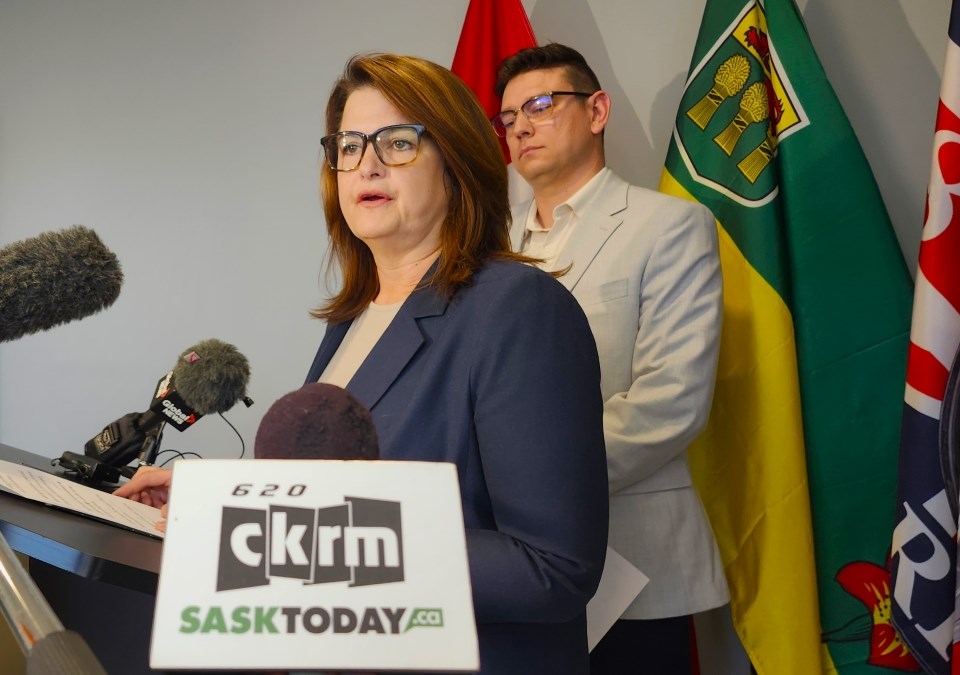SASKATOON — The issue of using water bombers during wildfires has become a boxing match between the government and the Saskatchewan NDP, as both parties continue to trade jabs.
On Wednesday, Opposition Leader Carla Beck and Cumberland MLA Jordan McPhail resumed criticizing the government for failing to use aircraft water bombers during one of the province’s worst wildfire seasons in over a decade.
Beck and McPhail shared more information they had gathered, including details on why half of Saskatchewan’s fleet of water bombers — including a brand-new aircraft that arrived in late May — were not in service. The wildfires began earlier that same month.
“This is just the tip of the iceberg. Today (Wednesday), we're here to reveal that nearly half of Saskatchewan's existing water bomber fleet was also quietly grounded without any public explanation,” said Beck in her opening remarks.
“According to the SPSA, Saskatchewan's fleet contains 10 air tankers — four Convair 580s and six CL-215T water bombers. Public flight data shows that two Convairs and two water-scooping CL-215s were out of service during this most critical part of the fire season.”
Beck added that the planes, which should have protected the communities affected by the wildfires, were grounded — with some, such as Convair tanker 474 (tail code C-GYSK), grounded since August of the previous year.
CL-215T tanker 216 (tail code C-FAFN) and CL-215T tanker 218 (tail code C-FAFP) have both been grounded since August 2024, and Convair tanker 473 (tail code C-GVSK) has been grounded since September last year.
Beck said Premier Scott Moe should be held accountable for the four planes failing to fly and for keeping the public in the dark, accusing the Saskatchewan Party-led government of being out of touch and taking residents for granted.
“This is a government that has put politics ahead of public safety, and this simply never should have happened. Saskatchewan people deserve so much better. The people in the North who have faced so much deserve better,” she said.
“They deserve a government that's focused on the future, and that has to include being prepared to protect communities as best we can. I want to say that Jordan is someone who has demonstrated time and time again that he cares deeply about the people he serves.”
The NDP also issued a statement after the government accused one of its MLAs of trespassing at the La Ronge Airport. The NDP stated that standing in a paid public parking lot to shoot a video does not constitute trespassing.
“The government’s statement is desperate, ridiculous and a blatant attempt to distract from the fact that nearly half of their air tankers were secretly grounded during the worst wildfires in a decade,” said the statement.
Government’s response
The government, in turn, criticized the Opposition for politicizing the tragedy. It said pilots need to be trained to operate the first of four new aircraft. Transport Canada requires 20 hours of flight training on the new aircraft, plus 25 hours specific to wildfire suppression.
“Those hours cannot be logged until the actual aircraft arrives. It is disingenuous for the NDP to suggest this plane could have been ‘brought into action the moment it arrived.’ Doing so would be dangerous for SPSA staff, crew and the general public, as well as a violation of Transport Canada regulations,” said the government in an earlier statement.
“Additionally, the pilots who are to receive the training on the new aircraft would have had to be removed from active duty, where they were fighting to save lives and protect Saskatchewan communities. The government will fully comply with Transport Canada regulations and ensure that our pilots are fully operational during a wildfire state of emergency, even if the Opposition does not.”
The government, in a separate statement, said the Saskatchewan Public Safety Agency (SPSA) has been using a combined fleet of land-based and amphibious wildfire tankers to deliver aerial services within the province.
Its wildfire-fighting fleet includes Convair 580A land-based air tankers, six CL-215T turbine-powered water-scooping tankers, and seven smaller bird-dog aircraft used to guide tankers and manage air traffic over and near wildfires.
The statement added that aircraft may occasionally experience mechanical issues, grounding them for short periods — from a few hours to a day — but at times they can be out for longer.
“This is a normal part of operating any air fleet. So far this season, mandatory inspections came due for two 215s sooner than expected due to the large amount of flying required to fight the wildfires,” the government’s statement said.
The government confirmed that the aircraft were grounded and unavailable for five days. Ground crews worked overnight to return them to service. It also acknowledged a national shortage of qualified and experienced aircraft maintenance engineers.
The statement said some vacant positions have been filled through partnerships with schools to recruit apprentices, and that the province has achieved some success in contracting Aircraft Maintenance Engineers (AMEs) while continuing to expand capacity.
A CL-215T and two CV580s are currently unavailable for various reasons, the government said. The CL-215T is out for the season due to structural inspections and repairs, which have also delayed the induction of another CL-215T. One CV580 is awaiting maintenance due to unavailable parts and is expected to return to service by the end of June. The other CV580 is grounded due to a failed propeller and related parts shortages.
The government stated the SPSA recognized the challenges early and brought in additional firefighting aircraft from other jurisdictions at the start of wildfire season.
“When the SPSA announced the purchase of the Q400S in 2024, it was clear that these new aircraft were to replace the current fleet of aging land-based aircraft, which will approach the end of their useful lifespan in 2027,” the statement said.




